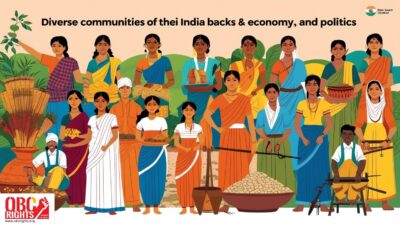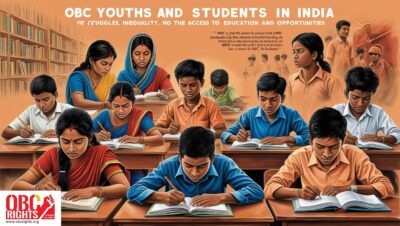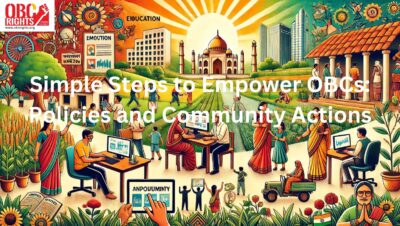The Other Backward Classes (OBCs) form an essential part of India’s social fabric, representing a diverse group of communities that have significantly contributed to the country’s culture, economy, and political evolution. Despite centuries of marginalization, the historical
role of OBCs highlights their resilience, adaptability, and the undeniable influence they have had in shaping modern India.
OBCs in Ancient Indian Society
Historically, Indian society structured itself around the varna system, dividing people into four broad categories: Brahmins, Kshatriyas, Vaishyas, and Shudras. Many OBC communities belonged to the Shudra varna or existed outside this rigid framework altogether. They traditionally engaged in agriculture, craftsmanship, trade, and other essential professions that sustained the economy.
These communities were the backbone of ancient India’s agrarian economy and artisanal industries. Farmers, weavers, potters, and blacksmiths—all vital contributors to local economies—were predominantly OBCs. Though their skills and labour ensured the prosperity of kingdoms and empires, yet they often remained socially marginalized due to the hierarchical nature of the caste system.
Cultural Contributions of OBC Communities
Other Backward Classes communities have enriched India’s cultural heritage by contributing their traditions, folk arts, and crafts. They have preserved and passed down indigenous knowledge systems, practiced agriculture, and developed artisanal techniques that people continue to celebrate today. These communities create folk music, perform dances, and share storytelling forms that are integral to regional cultures across India.
For example, communities like the Yadavs, traditionally associated with cattle rearing, have not only contributed to the dairy industry but also to folklore and myths surrounding Lord Krishna, a revered deity in Hinduism. Similarly, artisanal communities like the Kumhars (potters) and Lohars (blacksmiths) have been instrumental in creating tools and products that support both agriculture and daily life.
OBCs and the Freedom Struggle
The role of OBCs in India’s struggle for independence is formidable but often overlooked. Leaders from OBC communities, such as Jyotirao Phule and Narayana Guru, played a pivotal role in social reform movements that questioned caste-based discrimination and advocated for education and equality.
Jyotirao Phule, a visionary from the Mali community, established schools for girls and lower-caste children, laying the foundation for inclusive education. Similarly, Narayana Guru, a revered social reformer from Kerala, championed the rights of marginalized communities and emphasized spiritual equality. Their efforts not only uplifted OBCs but also inspired a broader movement for social justice in India.
Challenges During Colonial Rule
Under British colonial rule, OBCs faced compounded challenges. The introduction of land revenue systems disrupted their traditional occupations, forcing many into economic hardships. The colonial emphasis on creating a Western-educated elite further marginalized communities that lacked access to formal education. Higher communities spread the impression that OBCs did not deserve education, as they associated them with professions involving mostly hard labor.
However, the colonial period also saw the emergence of reformist movements led by Other Backward Classes leaders who recognized the importance of education and political representation. The rise of these movements laid the groundwork for post-independence policies aimed at addressing caste-based inequalities.
OBCs in Post-Independence India
After India gained independence, the government acknowledged the historical marginalization of OBCs through affirmative action policies. The establishment of the Mandal Commission in 1979 marked a landmark moment in recognizing OBCs. It identified the socio-economic disadvantages faced by these communities and recommended reservations in education and employment to level the playing field. The government did not implement reservations for OBCs for 42 years, from 1950 to 1992.
OBCs continue to face barriers in accessing quality education, healthcare, and economic opportunities. However, their historical contributions and resilience remain a source of inspiration for the ongoing struggle for social justice.
Lessons from History
The history of OBCs in Indian society is a testament to their perseverance and adaptability. From sustaining ancient economies to enriching cultural traditions and leading social reform movements, Other Backward Classes have played a vital role in shaping India’s identity. Their story underscores the importance of recognizing and addressing historical injustices to build a more inclusive and equitable society.
Conclusion
Understanding the historical significance of OBCs helps us appreciate their contributions and challenges. By learning from the past, we can build a future where all communities have equal opportunities to thrive. Advocating for OBC rights and empowering them not only ensures justice but also strengthens the nation as a whole. However, this raises a million-dollar question. Past and present ruling dispensations pamper and focus on communities with strong leaders—those with more MPs and MLAs. They crush OBCs between the bureaucracy dominated by higher communities and sections with reserved constituencies. OBCs lack awareness and clear boundaries.



